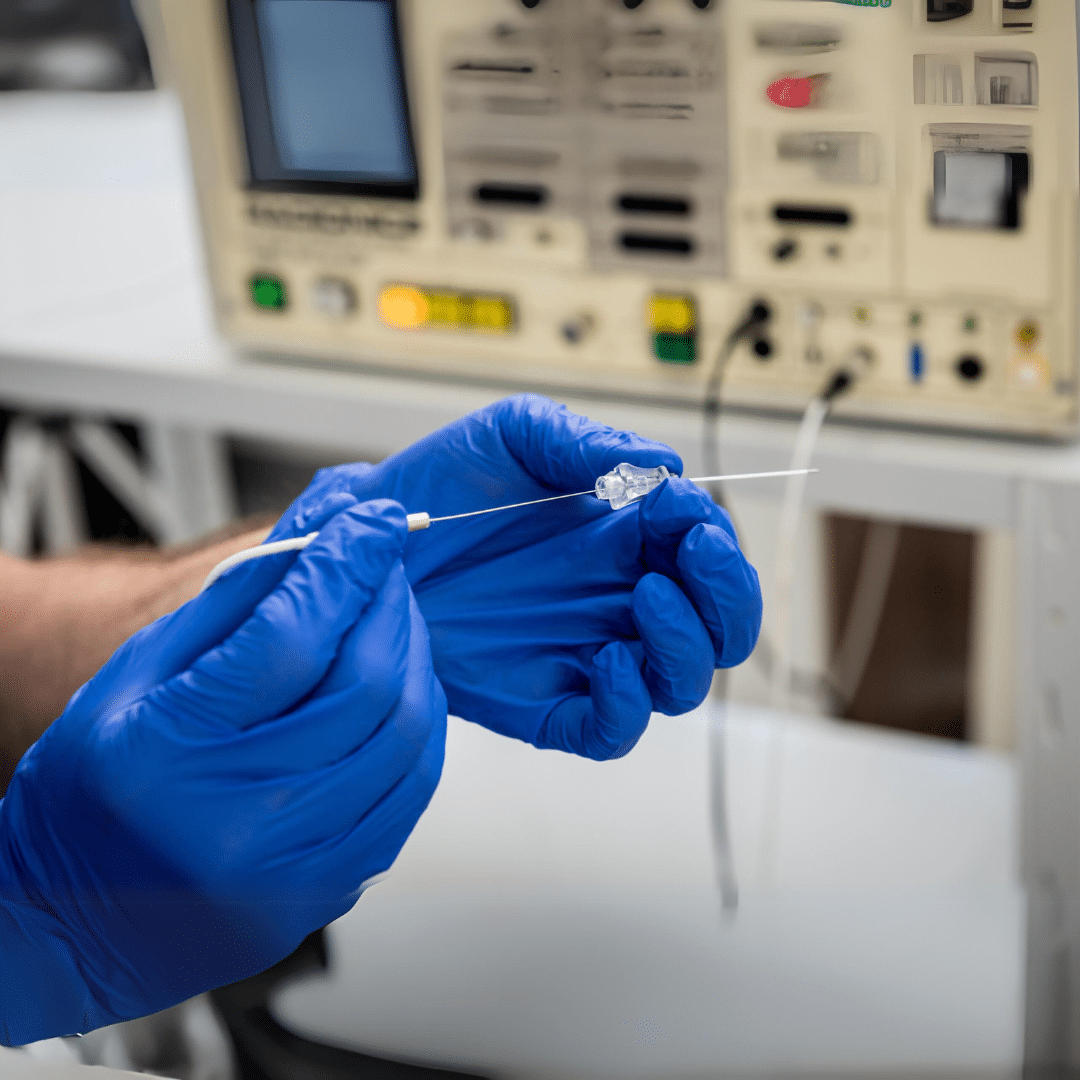Pulsed Radiofrequency Treatment (PRF) is a minimally invasive, non-surgical procedure offering effective relief for chronic pain without damaging surrounding tissues. It works by delivering short bursts of radiofrequency energy to targeted nerves, disrupting pain signals to the brain. Ideal for individuals with conditions such as cervical radiculopathy and complex regional pain syndrome, PRF provides significant pain reduction, improved mobility, and enhanced quality of life. With minimal recovery time and low risk of side effects, PRF represents a promising option for those seeking an alternative to traditional pain management methods.
Contact us today to book your consultation and take the first step towards a pain-free future.
Pulsed Radiofrequency Treatment (PRF) is an innovative, minimally invasive procedure aimed at alleviating chronic pain through a gentle approach that maintains tissue integrity.
This method interrupts the pain signals being transmitted to the brain without causing thermal damage to the nerves or surrounding tissues. PRF is exceptionally effective for treating a variety of conditions, including cervical radiculopathy, degenerative disc disease, and complex regional pain syndrome, offering patients a cutting-edge option for pain relief without the need for surgical procedures.

In contrast to traditional radiofrequency ablation, PRF administers short, controlled bursts of radiofrequency energy to the targeted nerves.
Ideal candidates for Pulsed Radiofrequency Treatment (PRF) are individuals experiencing chronic pain that has not responded well to conventional treatments such as medication, physical therapy, or surgery.
Patients considering PRF should have a clear diagnosis of a condition that is known to respond well to the procedure, based on a thorough evaluation by a pain specialist. This includes individuals with pain stemming from specific nerves or areas where PRF can be precisely targeted, such as peripheral nerves, the occipital region, and areas affected by conditions like pudendal neuralgia and pelvic pain. Ideal candidates are those seeking a non-surgical option that offers relief with minimal risk and downtime.
The Radiofrequency Ablation (RFA) procedure is meticulously designed to minimise discomfort and maximise efficacy in treating chronic pain. Initially, patients undergo a brief pre-procedure assessment to ensure they’re adequately prepared and to address any last-minute concerns. During the procedure, the patient is typically given a local anaesthetic and, if necessary, mild sedation to ensure comfort throughout the process.
Guided by fluoroscopic (X-ray) imaging and/or ultrasound, the physician precisely positions a thin needle near the targeted nerves responsible for the pain. Once correctly placed, a radiofrequency current is passed through the needle, heating the nerve and disrupting its ability to transmit pain signals to the brain. The entire process usually takes less than an hour and is conducted on a day procedure basis, allowing patients to return home the same day.
This advanced technique is applied to various anatomical sites, including the cervical, thoracic, lumbar medial branch, facet joints, sacroiliac joint lateral branches, genicular nerves of the knee, and the obturator and femoral nerves of the hip, tailored specifically to address the root cause of pain in these areas.
Recovery from Radiofrequency Ablation (RFA) is notably swift and with minimal complications, reflecting its status as a minimally invasive procedure. Immediately following the procedure, patients may experience some soreness or discomfort at the injection site, which typically resolves within a few days. Ice packs and over-the-counter pain relievers are often sufficient to manage this discomfort.
Most patients can resume their normal activities within 24 to 72 hours post-procedure, although it is advised to avoid strenuous activities for the first few days. It’s important for patients to follow any personalised aftercare instructions provided by their healthcare provider, including guidance on when to resume exercise or return to work.
The full pain-relieving effects of RFA may take up to three weeks to manifest, as the treated nerves gradually cease to transmit pain signals. Patients are encouraged to keep a pain diary and monitor their symptoms over this period, reporting any significant changes to their doctor. Regular follow-up appointments are crucial to assess the effectiveness of the treatment and to plan any necessary future interventions.
Patients who undergo Radiofrequency Ablation (RFA) for chronic pain management often experience significant and lasting relief. The effectiveness of RFA in reducing pain varies depending on the condition being treated and the individual’s specific health profile, but many report a noticeable improvement in their quality of life. For conditions such as chronic back pain, neck pain, knee pain, and hip pain, RFA has proven to be particularly beneficial.
The pain relief from RFA can last from six months to up to two years, and in some cases, even longer. This duration allows many patients to engage more fully in physical therapy and other rehabilitative measures, further enhancing their recovery and overall well-being. It’s also worth noting that RFA can be repeated if the pain begins to return, offering a sustainable option for long-term pain management.
Patients appreciate the minimally invasive nature of RFA, which significantly reduces the risks and recovery time associated with traditional surgery. As a result, RFA stands out as an effective treatment modality for those seeking to manage their chronic pain with minimal intervention.
Are you ready to take the first step towards a life free from chronic pain? Contact the Sydney Pain Clinic today to schedule your consultation. Our team of experts is ready to assess your condition and discuss whether Radiofrequency Ablation could be the right solution for you.
The content of this website is intended solely for general informational purposes. It should not be regarded as conclusive medical advice under any circumstances. We strongly advise consulting with top-tier pain management experts and medical professionals at Sydney Pain Clinic for any queries or concerns. A comprehensive assessment is essential for a precise diagnosis and treatment strategy. Remember to contact our pain management specialists and clinicians in Sydney to arrange a consultation.

18 Roslyn Street, Potts Point 2011 NSW
85 Burwood Road, Burwood 2134
63A Archer Street, Suite 112, Chatswood 2067
Best Rated Pain Management Doctors, Specialists and Clinicians in Sydney
© 2024 SYDNEY PAIN CLINIC. ALL RIGHTS RESERVED.